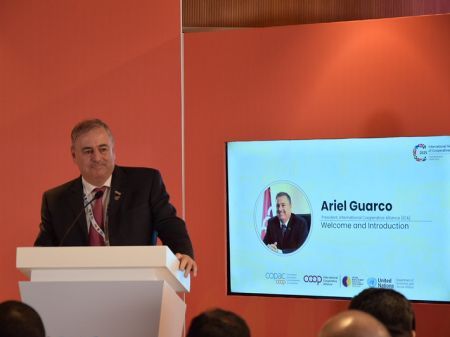
With her two-year term coming to an end, Alliance president Monique F. Leroux reflected on the organisation’s activity under her guidance.
In a new report she highlights some of the Alliance’s collective efforts grouped under five pillars of action: economy and leadership; sustainable development; interco-operation; gender equality and the next generation; and innovation.
In terms of economy and leadership, the Alliance has focused on making the co-operative movement’s voice heard in international forums and at major economic gatherings. Co-ops were represented by the Alliance at the B20 meetings, where its recommendations touched on the importance of winning conditions for creating an environment that is conducive to creating sustainable businesses, quality jobs and a context that helps local producers access global markets.
“As co-chair of the working group on SMEs, I had the chance to present those recommendations, which represent sustainable aspirations for our businesses,” writes Ms Leroux.
Furthermore, co-ops had a presence at the International Economic Forum of the Americas’ Conference in Montreal, the World Credit Union Conference and the International Co-operative and Mutual Insurance Federation (ICMIF) Biennial Conference.
On sustainable development the Alliance presented the key contributions of co-ops at high-level meetings at the UN’s headquarters in New York. Co-ops were also the first economic group to commit to the SDGs and prompt co-ops to introduce tangible measures to meet these through the online platform Co-ops for 2030.
Interco-operation was another important key area of action for the Alliance, which signed an agreement with the European Commission. The regional offices hosted various activities associated with the implementation of the partnership from Montevideo in Uruguay, to Hanoi in Vietnam, as well as Malta in the Mediterranean and Casablanca in Morocco. These major events helped promote the co-operative model throughout the continents.
In addition, through leadership circles and co-operative roundtables, the Alliance looked to ensure that its strategic actions supported the objectives of the Blueprint for a Co-operative Decade.
Other events gave the Alliance the opportunity to demonstrate the importance of co-operation, such as the Business Convention Canada-France, the annual meetings of the of the Conseil québécois de la coopération et de la mutualité or the International Summit of Co-operatives, Quebec City, Canada, 2016.
The issue of gender equality was also high on the Alliance’s agenda.
“We were fortunate to have platforms such as the Senate Symposium on the 150th Anniversary of Canadian Confederation, and a meeting with other Canadian and American women of influence (business women and entrepreneurs) at the White House where we were able to talk about our actions and the efficiency of our model.
“We presented some of the data demonstrating the co-operative movement’s leadership in regard to equality. In 2015, for example, worldwide, 48% of insurance mutuals and co-operatives had at least three women on their board of directors, compared to 17% in the industry overall,” writes Ms Leroux in her report.
Through a series of meeting and events the Alliance also sought to exchange ideas and build on the sector’s ability to innovate. These included Visits to co-operative businesses in Australia, Bulgaria, Canada, China, England, Finland, France, Germany, Japan, New Zealand, South Korea and the United States.




